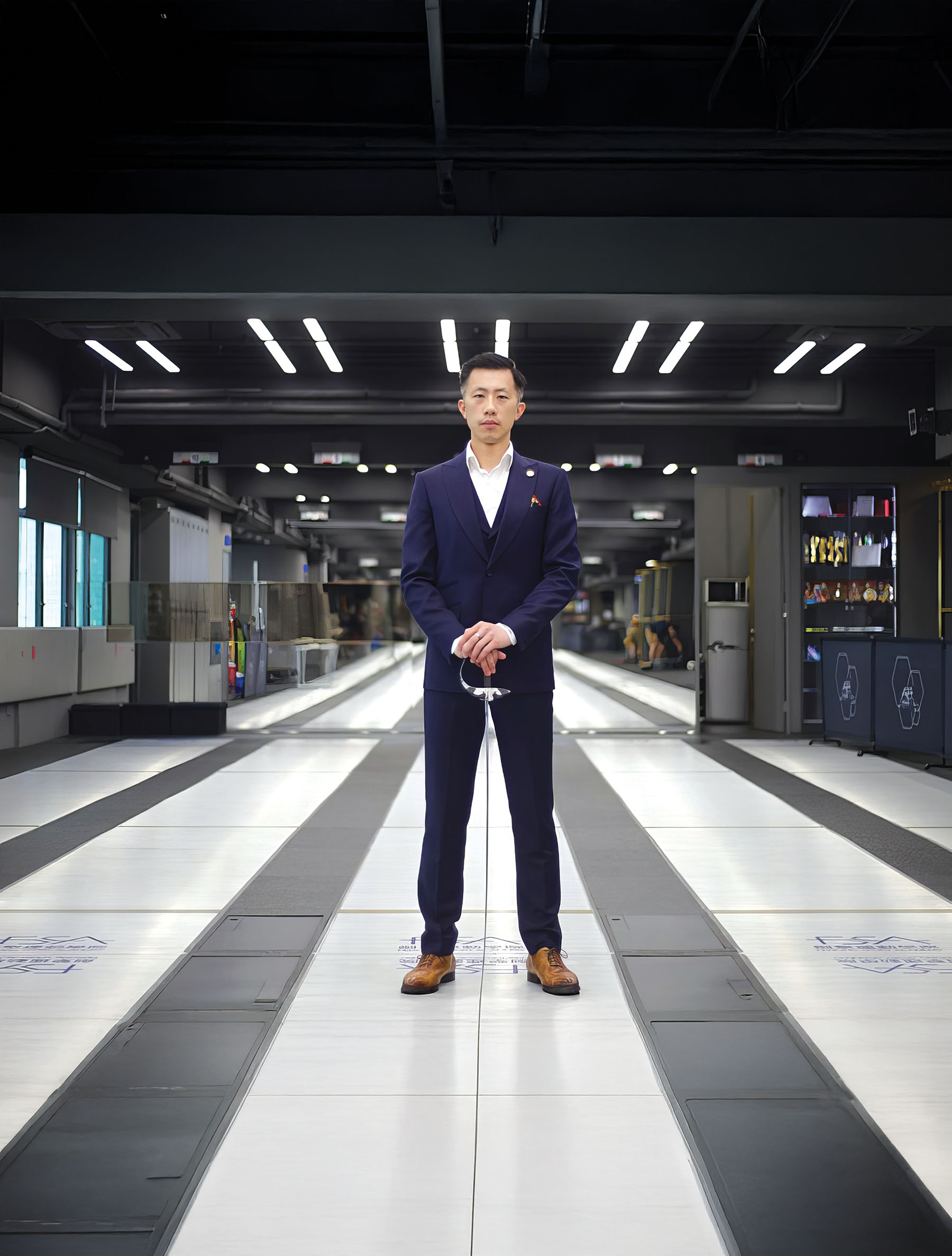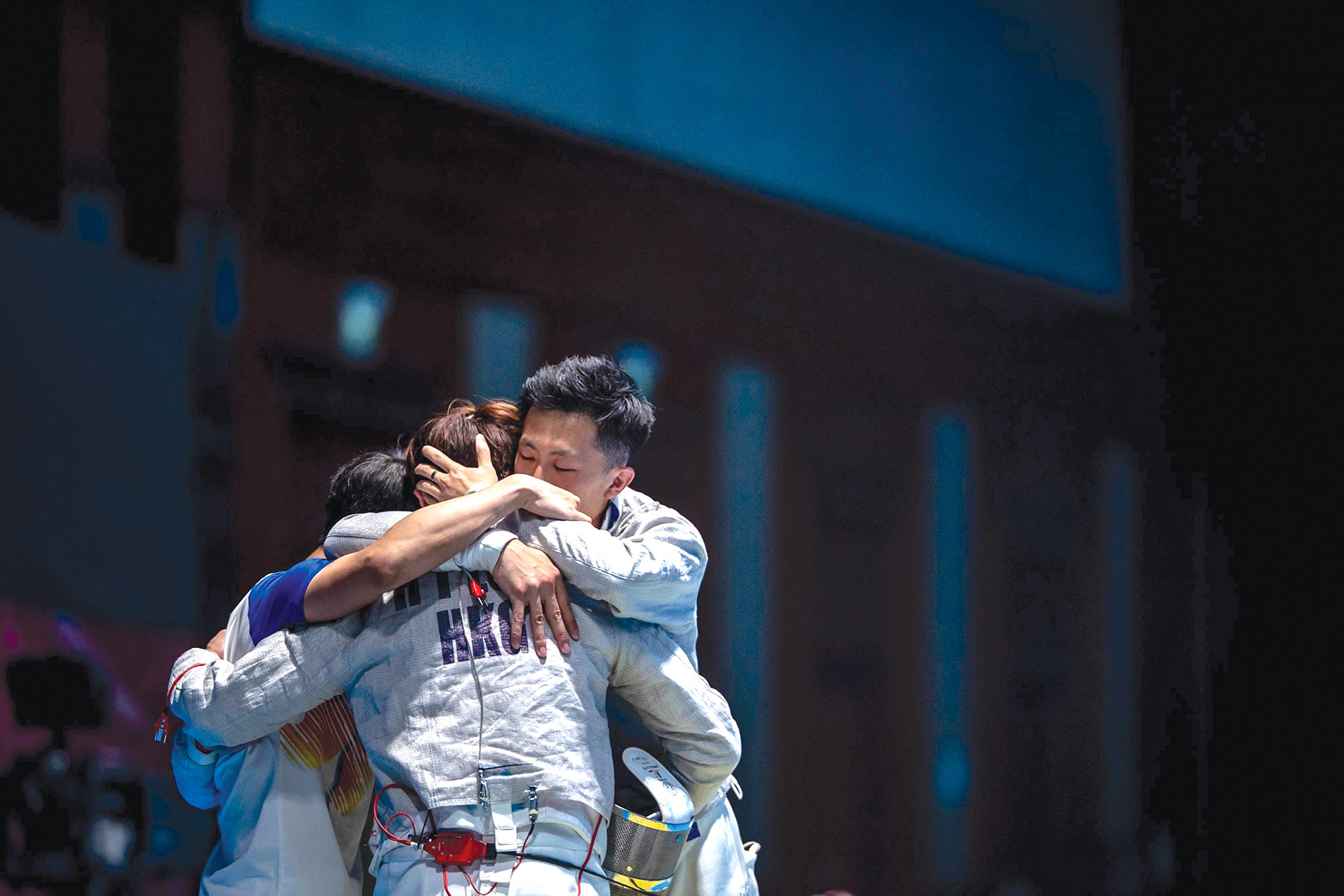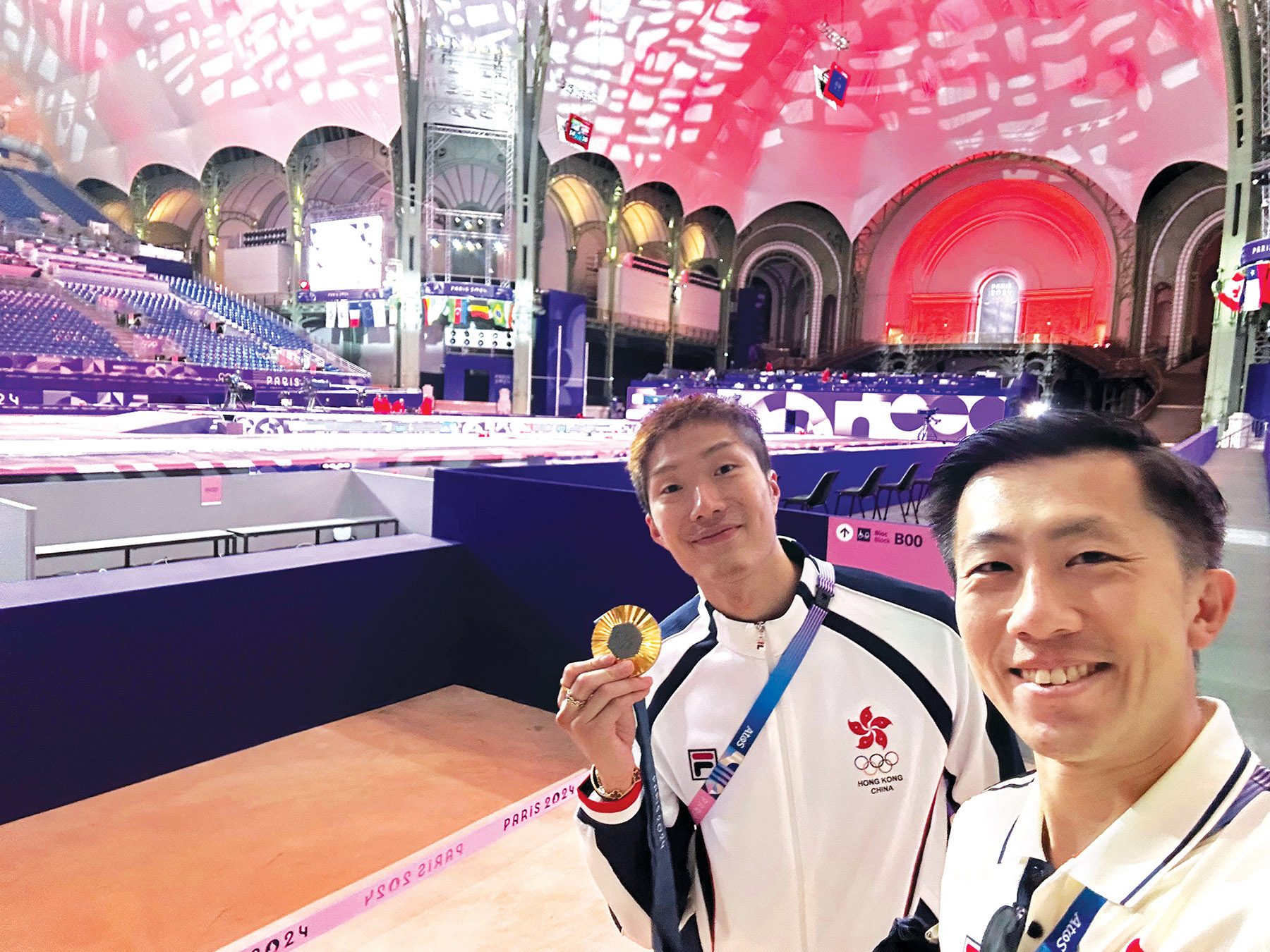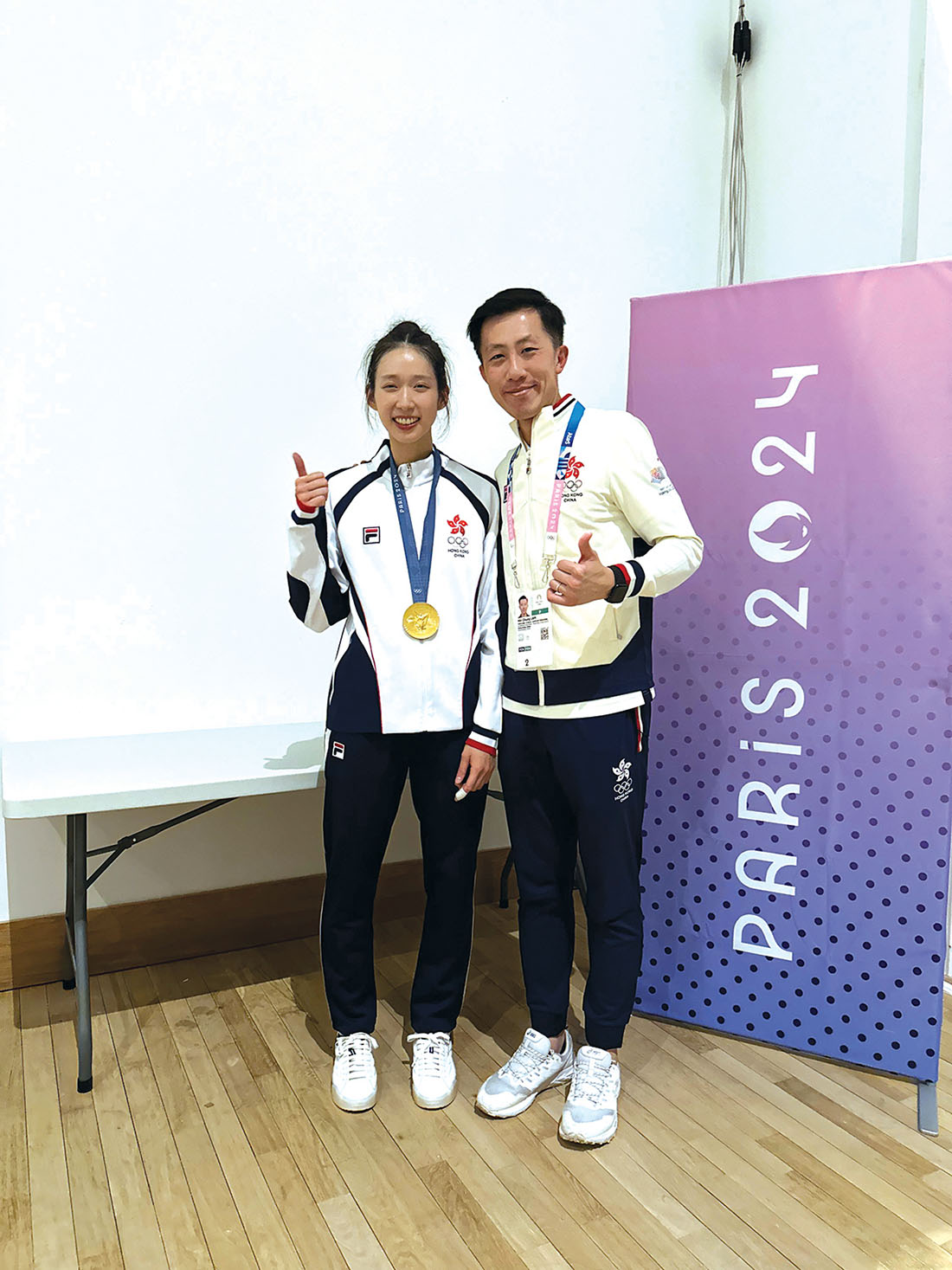Retired Hong Kong fencing star Antonio Lam Hin-chung hopes to pass the baton to aspiring athletes for them to carry the city’s banner high in the world sports arena. He talks to Wu Menglei.

At the 2024 Paris Olympic Games, fencer Antonio Lam Hin-chung, a stalwart figure renowned for his multiple medal-winning feats, graced the field as the leader of the Hong Kong, China Fencing team. From a professional swordsman to a maestro in the fencing realm, he has witnessed the development of Hong Kong’s sports industry in the past two decades and is now devoted to nurturing the city’s future stars.
Before lifting the burden of being a fencing athlete in March 2020, Lam had competed in four consecutive Asian Games since 2006 in his 19-year fencing career, and won three medals. He also took part in the 2012 London Olympic Games.
When the 2006 Doha Asian Games drew to a close, he stood as the final men’s saber fencing player of the Hong Kong, China team. “After all my senior colleagues had chosen to leave, I began training seriously and was eager to make the grade,” he says.
“From another perspective, I consider myself fortunate to have been a fencing athlete as fencing has emerged as a sport in Hong Kong since 1949. My predecessors had laid a strong foundation by the time I entered the professional arena,” says Lam, who decided to carry forth the legacy of the special administrative region’s fencing team.
READ MORE: Kong clinches HK's first gold medal in Paris
Determined to make a mark for himself in fencing, he believes perseverance is easier said than done. “But, having seen my fellow apprentices emerge one after another helped build up my belief that I had chosen the right path,” he says.
The most important thing in his mind then was: “How could I further expand the popularity of the sport?” With never-ending ambition, he was resolved to pass on the baton to more people.
In Lam’s opinion, in order to sustain the performance of the SAR’s fencing team, the city needs more athletes who are devoted to the sport, and more competitions where they can put their skills to the test.
“Most people see fencing as an aristocratic sport due to the expensive equipment and high tuition fees involved,” he explains. To attract more talented young people, he decided to break the financial barrier and trained his sights on students who are not financially well-off, or who come from ethnic minority families. “I want to treat all my students on an equal basis. I think the most important thing in learning fencing is passion,” he says.

Strict selection process
In promoting fencing in schools in the past few years, Lam says he found many students from economically disadvantaged families have great potential, and their chance of becoming a professional fencer could easily slip away if not given a chance.
He came across a student from a grassroots family who was initially introverted and left a strong impression on him. “His personality was a little introverted back then, but he practiced hard and stood out from a fencing competition,” he says. Observing the student’s transformation into a more confident and outgoing individual, Lam decided to support him with the funding he needed.
Lam has been funding other talented students as well, but only five percent of them can overcome his strict selection process to secure financial support. He aims to pick the top talent from a group of around 400 children who are interested in fencing. Once someone is chosen, he will support them for several years until they can join the Hong Kong fencing team.
To cultivate talented fencing players, Lam founded a fencing hall and organized various events, but there were funding obstacles. “The technology companies can get generous financial support from the government, but there are few governmental funding projects for sports companies,” he says, adding that private sponsors are paramount regardless of whether funding students or organizing events.
In December, Lam facilitated the second Asian Youth Elite Fencing League in Macao — a competition for children aged 8 to 14 years old that attracted over 800 participants from the Chinese mainland, the Hong Kong and Macao SARs, Taiwan, Malaysia and Singapore.
Lam admits it is still hard for most athletes to make any sport a lifetime career. “Most Hong Kong parents are worried about their children taking up fencing as a profession. Even for financially well-off families, parents tend to choose a more promising career for their children, such as in the medical or legal professions,” he says.
Lam has a string of public accolades under his belt. He is a member of the Cultural, Sports and Tourism Bureau Elite Sports Committee of Hong Kong, and was among the 51st “Hong Kong Ten Outstanding Young Persons”.
Despite his achievements, he still finds promoting fencing difficult. “I think my continued efforts to promote the sport have made me stressed. It’s as hard as the training itself,” he says.
As he no longer needs to continue practicing daily, Lam puts all his endeavors into training his students to compete in future Olympic Games.
The HKSAR government has devoted a lot of attention to promoting sports through various channels, including organizing mega sports events and raising awareness of sports in the community.
Efforts to turn more Hong Kong people into professional athletes have gained momentum in recent years.

Raising awareness
“The 2020 Tokyo Olympic Games and the 2024 Paris Olympic Games attracted immense interest among residents. This trend, with the financial backing of large institutions, is crucial to building up our young athletes, and offers the best nutrients for cultivating the next generation of fencers,” says Lam.
In addition, key players in Hong Kong’s sports industry are striving to promote the influence of athletes in enhancing residents’ awareness through events and awards, including the Cathay 2024 Hong Kong Sports Stars Awards (HKSSA).
The 2025 HKSSA will present awards in four categories on April 17, for Men, Women, Sports Combination, and Team Only Sport.
“We hope residents can learn more about athletes with these awards,” said Timothy Fok Tsun-ting, president of the Sports Federation and Olympic Committee of Hong Kong, China.
He said Hong Kong’s athletes have achieved outstanding results at many major international sports events. Last year, the Hong Kong, China team won two gold and two bronze medals at the 2024 Paris Olympic Games — the first time in the city’s history its athletes had secured gold medals at two consecutive Olympic Games and the first time it had won more than one gold medal at the same Olympics.
ALSO READ: HK: Leveraging Olympic successes, growing with sports
Compared to the time when Lam was competing in international events, both the number of coaches and amount of subsidies for full-time athletes in Hong Kong have grown. The Hong Kong Sports Institute has also expanded and upgraded its equipment.
The maximum funding for a senior athlete was set at about HK$150,000 ($19,000) annually two decades ago. The current amount of funding available is four times that.
To bolster the sustainable development of elite sports in Hong Kong, practitioners may broaden the scope of funding sources rather than relying on government funding. Legislative Council member Kenneth Fok Kai-kong said investment from commercial organizations is indispensable in driving the global sports industry.
He noted that in 2020, about 63 percent of the total revenue of more than 70 sports associations in Japan came from the commercial sector, with only 18 percent from public funding.
Through his dedication and drive, with the concerted efforts of Hong Kong athletes, institutions, and sports supporters, Lam hopes to realize his dream of seeing a Hong Kong Olympic champion in the men’s saber event, while also advancing the sports industry.

Lam’s background
2000: Began learning fencing at the age of 14
2001: Joined the Hong Kong, China Fencing Team
2006: Participated in the Doha Asian Games
2010: Participated in the Guangzhou Asian Games
2012: Represented Hong Kong, China at the London Olympic Games
2013: Won a silver medal in the East Asian Games
2014: Became a double bronze medalist at the Incheon Asian Games
2018: Won a bronze medal at the Jakarta Asian Games
2007-2018: Representative of the Hong Kong men’s saber team, ranking No 1 in the Hong Kong men’s saber event for 11 consecutive years
2021: Team manager of Hong Kong, China Fencing Team
2023: Member of Elite Sports Committee of the Culture, Sports and Tourism Bureau; awardee of Ten Outstanding Young Persons 2023
2025: Acting honorary secretary and team manager of the Hong Kong, China Fencing Team
Contact the writer at thor_wu@chinadailyhk.com


